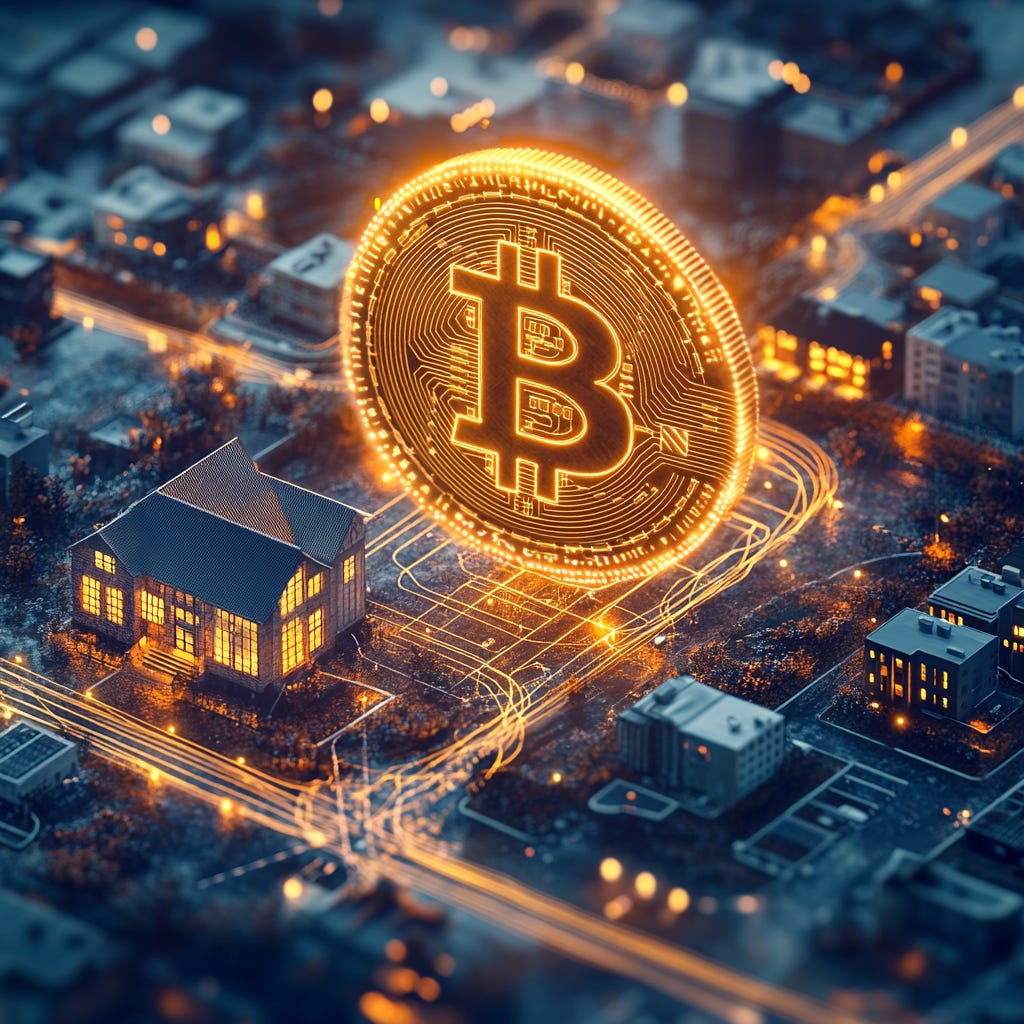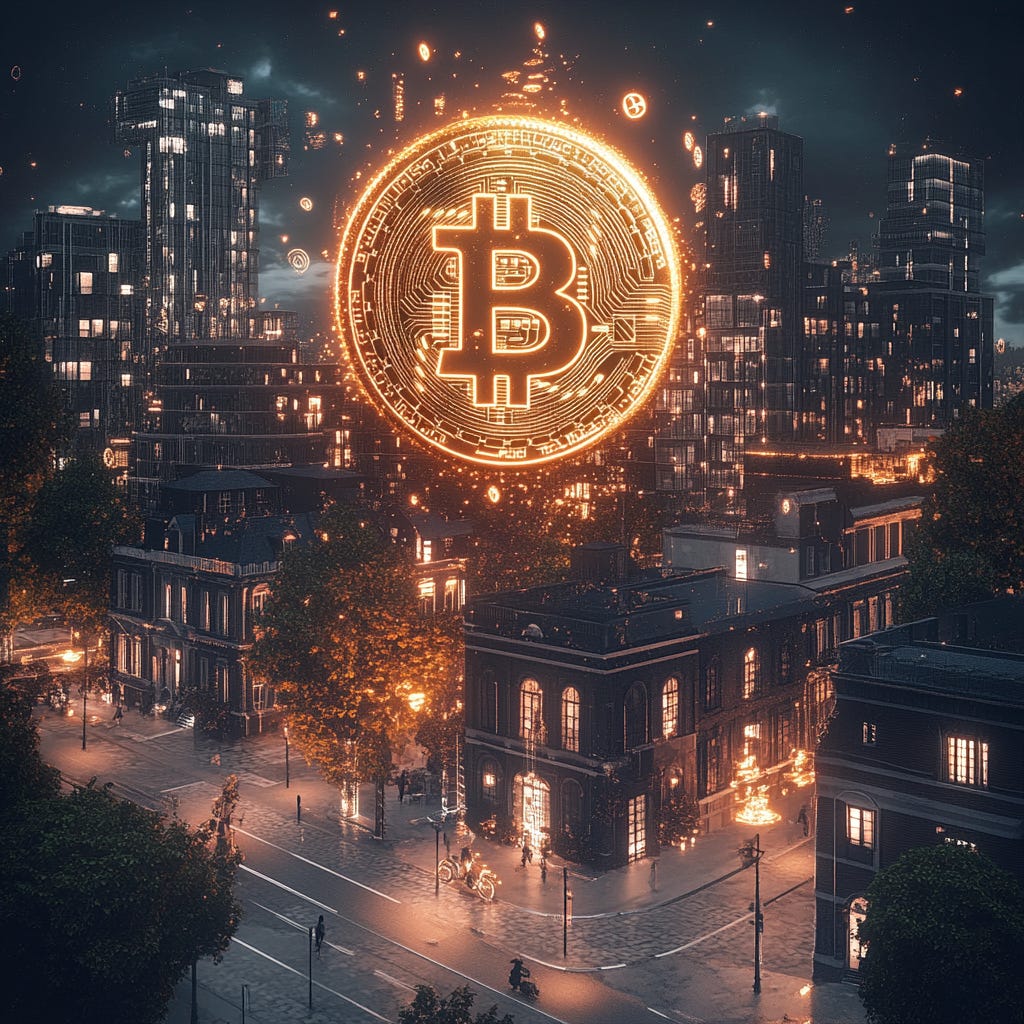Introduction
A store of value is a critical concept for preserving wealth, ensuring it maintains or increases purchasing power over time. For decades, real estate has been a go-to asset class for those seeking to safeguard and grow their wealth. However, the emergence of Bitcoin has disrupted traditional notions of value storage. As the world's first decentralized digital asset, Bitcoin offers unique attributes that make it superior to real estate as a store of value. Michael Saylor, a prominent Bitcoin advocate, has eloquently articulated this perspective, highlighting Bitcoin’s unmatched advantages in today’s financial landscape.
1. Accessibility and Portability
Real estate, by its nature, is immobile and illiquid. Transacting real estate requires significant time, money, and reliance on intermediaries such as agents and lawyers. In contrast, Bitcoin is a fully digital asset that can be accessed and transferred globally with an internet connection. Moving millions of dollars worth of Bitcoin can be accomplished within minutes, at a fraction of the cost it would take to sell or transfer a property. This makes Bitcoin far more accessible and portable for a globalized economy.
2. Divisibility and Liquidity
Real estate lacks divisibility; you cannot sell a fraction of your home or commercial property to unlock liquidity. Bitcoin, on the other hand, is divisible into 100 million satoshis, allowing transactions of any size. This flexibility enables Bitcoin holders to liquidate small portions of their holdings without selling their entire asset, a clear advantage for maintaining financial agility.
3. Maintenance and Carrying Costs
Owning real estate comes with ongoing expenses such as property taxes, insurance, maintenance, and management fees. These costs can erode returns over time. Bitcoin, when self-custodied, has negligible carrying costs. A simple hardware wallet ensures secure storage without the need for intermediaries or recurring fees.
4. Resistance to Seizure and Confiscation
Real estate is vulnerable to government seizure through mechanisms like eminent domain or increased taxation. In extreme scenarios, political instability or war can result in the loss of property rights. Bitcoin’s decentralized nature and cryptographic security make it significantly more resistant to confiscation. As long as the private keys are securely stored, Bitcoin remains untouchable by external forces.
5. Scarcity and Supply
Bitcoin’s supply is capped at 21 million, ensuring absolute scarcity. This fixed limit is encoded in its protocol, making it immune to inflationary pressures. In contrast, the supply of real estate is not fixed. Governments can rezone areas, developers can build new properties, and urban sprawl can increase the housing supply, diluting value.
6. Global Demand and Market Dynamics
Bitcoin is a truly global asset, accessible to anyone with an internet connection. Its market operates 24/7, with demand spanning borders and cultures. Real estate markets, however, are highly localized and influenced by regional economic conditions. A downturn in one geographic area can significantly impact property values, making real estate less resilient to global economic shifts.
7. Inflation Hedge
Both Bitcoin and real estate are considered hedges against inflation. However, Bitcoin’s performance over the past decade has outpaced real estate, offering superior returns on investment. Additionally, real estate’s reliance on fiat-based loans ties it closely to the traditional financial system, which is increasingly unstable. Bitcoin’s independence from fiat currencies strengthens its position as a reliable inflation hedge.
8. Sovereignty and Privacy
Bitcoin empowers individuals with true ownership, free from intermediaries. Transactions are pseudonymous, offering a level of privacy unmatched by other asset classes. Real estate ownership, in contrast, is publicly recorded, making it less private and more susceptible to scrutiny and government interference.
9. Flexibility and Innovation
Bitcoin’s utility extends beyond being a store of value. It can be used as collateral, for payments, or even integrated into decentralized financial applications. Real estate’s utility is far more limited, primarily serving as a residence or a source of rental income. This rigidity reduces its appeal in an increasingly dynamic financial environment.
10. Environmental Considerations
Bitcoin mining has faced criticism for its energy consumption, but it’s increasingly powered by surplus and renewable energy. Innovations in mining efficiency continue to reduce its environmental impact. Conversely, real estate development often results in deforestation, urban sprawl, and significant resource consumption, leading to lasting environmental consequences.
Counterarguments and Rebuttals
Critics of Bitcoin often cite its volatility compared to real estate’s stability. While this was true in Bitcoin’s early years, its volatility has decreased over time as adoption grows. Moreover, Bitcoin’s exponential returns compensate for its perceived risk. Another common argument is that real estate offers dual utility as both an investment and a physical space. Because the money is broken, real estate has been monetized far beyond its utility value which sets it up for demonetization against a superior store of value over the long run.
Conclusion
Bitcoin’s unique attributes—portability, divisibility, scarcity, resistance to seizure, and global accessibility—position it as the superior store of value in today’s rapidly evolving financial landscape. As Michael Saylor aptly puts it, “Bitcoin is the apex property of the human race.” With its fixed supply, low carrying costs, and unparalleled utility, Bitcoin offers a revolutionary alternative to traditional assets like real estate. As more individuals and institutions recognize its potential, Bitcoin’s role as the ultimate store of value will only strengthen, reshaping the future of wealth preservation.
Not financial or legal advice, for entertainment only, do your own homework. I hope you find this post useful as you chart your personal financial course and Build a Bitcoin Fortress in 2024.
Thanks for following my work. Always remember: freedom, health and positivity!
Please also check out my Bitcoin Fortress Podcast on all your favorite streaming platforms. I do a weekly Top Bitcoin News update every week on Sunday, focused on current items of interest to the Bitcoin community. Please check it out if you haven’t already. Also now on Fountain, where you can earn Bitcoin just for listening to your favorite podcasts.
Follow me on Nostr:
npub122fpu8lwu2eu2zfmrymcfed9tfgeray5quj78jm6zavj78phnqdsu3v4h5
If you’re looking for more great Bitcoin signal, check out friend of the show Pleb Underground here.
Lightning tips appreciated here.






I am curious if replacing the words real estate with, instead, land would alter any of these points. Land, in of itself, cannot be created out of thin air. Also; it has a high demand and if you own land that is free from government control; lessons the burden for taxes, regulation, and fees. These would be a rebuttal of sorts.